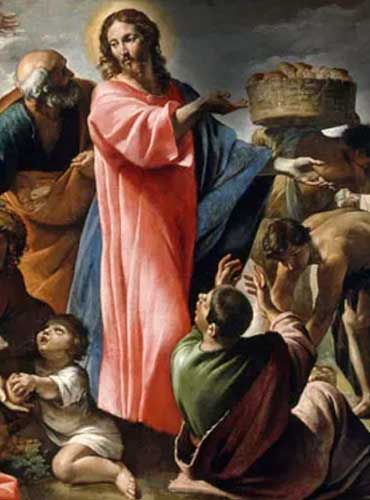Friday of the Second Week of Easter – Option 1 – Jn 6:1-15
In the Summa Theologiae (I, q. 19, a. 1), Aquinas tells us that God’s will is always accomplished, no matter what, and, reflecting on this, he says: “Since . . . the will of God is the universal cause of all things, it is impossible that the divine will should not produce its effect. Hence that which seems to depart from the divine will in one order, returns into it in another order; as does the sinner, who by sin falls away from the divine will as much as lies in him, yet falls back into the order of that will, when by its justice he is punished.” In other words, things that seem to go against the divine will, in reality accomplish or fulfill it, but on a different level.
In today’s first reading, the rabbi Gamaliel explains to the Sanhedrin that merely human endeavors are always doomed to failure, and that the Jews can’t expect to fight against God and win. In other words, God’s will is always accomplished, and the one thing that we must seek, as the Psalm recounts, is to dwell in God’s house, to be united to Him at every moment. Even when things seem bleak, as was the situation in today’s Gospel, God is there, in charge of the situation, no matter how sad, distressing, or embarrassing it might seem.
How are we to put this into practice in our lives? We can consider an event in the life of Saint Louis de Montfort: the fiasco of the Calvary at Pontchâteau. After having preached eight popular missions in the vicinity of Pontchâteau, “Montfort dreamed of building a gigantic Way of the Cross, which would dominate the entire countryside.”[1] He obtained the land, and in May of 1709 work began. The labor was all volunteer; inspired by de Montfort, over 20,000 people from as far away as Italy and Spain came to help. Everything was donated as a gift to God. The work was finished, and the date for the blessing was set for September 14th, 1710.
However, there were some who were angry at Montfort, for whatever reason. They and those in power managed to convince the king that the Calvary was to be a fortress, a threat and risk to national security, and so, on September 13th, while Montfort was away preaching a mission, he received word that the blessing had been called off. He hurried on foot through the night in order to see the bishop, arriving, exhausted, on the morning of the 14th. The bishop gave him the sad news: although he had fought as hard as he could against the authorities, there was nothing that could be done. The king ordered the Calvary, so painstakingly and lovingly built by volunteers, to be taken down, block by block, by the peasants (many of whom had helped build it) under the army’s watchful eye. “Montfort’s personal humiliation must have been nothing compared to the anguish he felt for all those who had invested so much of their energy and time in the Calvary of Pontchâteau.”[2]
At the bishop’s advice, Montfort went on retreat, but, in that time of silent suffering, the Jesuits who ran the retreat house were amazed at his attitude. As one wrote later: I thought I would find him downcast and disappointed; I had prepared myself to do as much as I could to console him; but I was astonished to find him happier and more peaceful than I myself was. I said to him jokingly, “My, you are acting like a strong and courageous fellow!” . . . “I am neither strong nor courageous,” he replied, “but, thanks be to God, I am neither grievously pained nor desolate; I am at peace.” [I asked him] “You are content, then, that they have destroyed your Calvary?” “I am neither content nor discontent. The Lord allowed me to have it built; but now He has allowed it to be destroyed. Blessed be His Holy Name! If it had depended on me, the Calvary would have stood till the end of time, but since it depends upon God, may His will be done and not mine. I would prefer, O My God, to die thousand times . . . than to oppose your Holy Will.”[3] “If it had depended on me, the Calvary would have stood till the end of time, but since it depends upon God, may His will be done and not mine. I would prefer, O My God, to die thousand times . . . than to oppose your Holy Will.”
This conformity, or uniformity, with God’s will, is what makes saints. Today, let us pray, through the intercession of Mary, Mother of our Risen Lord, for the grace to embrace God’s will and love it with all our hearts.
[1] Thelagathoti Joseph Raja Rao, The Mystical Experience and Doctrine of St. Louis-Marie Grignion de Montfort (Rome: Editrice Pontificia Università Gregoriana, 2005), 197.
[2] Ibid., 197.
[3] Ibid., 198.





